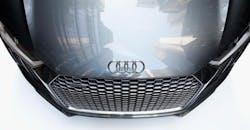Prosecutors Raid Homes of Ex-Audi Executives in Expanded Probe
German prosecutors broadened a criminal investigation of Audi AG’s role in diesel-emissions cheating for a fourth time, with raids now targeting two former management-board members of the luxury-car maker.
Two weeks after a search of Audi’s headquarters in the nearby city of Ingolstadt, Munich prosecutors inspected the homes of three people, according to a statement on Feb. 22 according to Andrea Mayer, a spokeswoman for the office. The workplace of one of the people was also searched.
The latest raids bring to 17 the number of people under investigation for diesel-engine rigging at Audi, part of Volkswagen AG.
The expanded investigation comes as a German court considers whether cities could be forced to ban diesel cars -- underscoring the mushrooming debate over diesel’s future that was sparked by the 2015 VW cheating scandal. As carmakers race to introduce electric-powered models, a top German judge said on Feb. 21 that EU rules impose “a pretty clear duty” to meet pollution limits that German cities routinely overshoot.
The homes of former development heads Ulrich Hackenberg and Stefan Knirsch have been raided, Wirtschaftswoche reported without saying where it got the information. Lawyers for both weren’t immediately available for comment. Audi spokesman Juergen de Graeve said he couldn’t immediately comment, reiterating that the company is continuing to fully cooperate with the authorities.
Hackenberg left the Volkswagen brand in 2015. He was a close confidant of former Volkswagen CEO Martin Winterkorn -- himself a former Audi board member in charge of development -- who was forced out days after the scandal erupted. Hackenberg’s successor Knirsch had to step down after just 10 months in 2016, also in connection with the diesel manipulation.
The probe, which has involved raids of Audi-related premises since March 2017, focuses on potential consumer fraud tied to Audi’s role in developing tainted 3-liter diesel engines that parent Volkswagen sold in the U.S., as well as deliveries in Germany. Prosecutors are looking at a minimum 210,000 diesel cars sold since 2009, according to an earlier statement.
VW has faced a barrage of investigations and lawsuits since U.S. authorities disclosed in September 2015 that the Wolfsburg, the Germany-based carmaker had rigged engines on 11 diesel models to cheat on emissions tests. The company has settled proceedings in the U.S., taking more than 26 billion euros (US$32 billion) in provisions for fines, settlements and other costs since the scandal came to light.
Investor lawsuits continue, and new allegations that Volkswagen diesel cars were sold overseas with rigged software after its settlement have prompted calls by U.S. congressional representatives for a new probe in that country.
By Elisabeth Behrmann and Karin Matussek
About the Author
Bloomberg
Licensed content from Bloomberg, copyright 2016.
